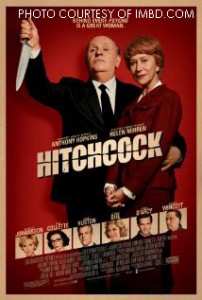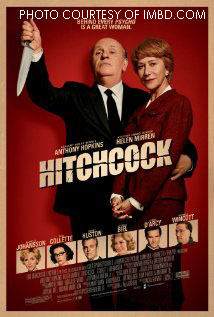
Hitchcock, directed by Sacha Gervasi, tells the love story between director Alfred Hitchcock (played by Anthony Hopkins) and his wife Alma Reville (Helen Mirren) isolated during the filming of one of his greatest films, Psycho.
The film documents Hitchcock’s struggle in making Psycho, Paramount Pictures’ reluctance to fund and distribute the film and the lukewarm-at-best acceptance of the movie initially. Throughout the film, one person stays at Hitchcock’s side, no matter Psycho’s backlash or criticism, Hitchcock’s obsession with his leading ladies or Hitchcock’s idea of funding the movie himself — Alma Reville.
Hopkins became Hitchcock for the film, embracing his twisted mind and large stomach — a long-running joke throughout the movie — and giving the audience a glimpse into what we truly believe is Hitchcock’s mind, including the constant visions throughout the movie of Ed Gein speaking to Hitchcock. Shots of Hopkins’ staring face as he realizes where Reville is at that moment or as he thinks about the supposed fate of Psycho, is incredible. Hopkins’ performance is second only to Helen Mirren as Alma Reville herself.
Helen Mirren’s portrayal of the devoted but occasionally frustrated Reville is the highlight of the acting in Hitchcock. Mirren gives depth and understanding to Reville’s situation — she loves Hitchcock and puts up with his shenanigans, but he is nearly an unbearable man. He’s always searching for his perfect blonde and is incredibly stubborn in the work he chooses to make. Nobody but Hitchcock wanted to see the twisted story of a transvestite murderer in love with his dead mother, not even Reville, who preferred a book by a man named Whitfield Cook. Even so, Reville was loyal to Psycho and Hitchcock, and Mirren nailed it perfectly.
Scarlett Johansson captured Janet Leigh (well, Marion Crane) superbly, especially during the recreation of both the famous shower scene and Crane’s drive to Bates’ Motel. Jessica Biel played Vera Miles (Lila Crane) well, but her performance did not quite compare with Johansson’s. Aside from Johansson, the other star of Psycho’s actors was James D’Arcy, playing Anthony Perkins who portrayed Norman Bates (the murderer based on Ed Gein) in Psycho, and expressing Perkins’ general shiftiness superbly.
Hitchcock takes a part of Hitchcock’s life and tells the story interweaved with the story of Psycho, showing a direct correlation between Hitchcock’s life and work. The movie begins with the successful premiere of North by Northwest and the start of the search for Hitchcock’s next film.
Overall, Hitchcock is enjoyable to watch, especially for Hitchcock fans (the end of the movie features a shout-out to The Birds). The film is much slower than Hitchcock’s suspenseful greats, but it tells Hitchcock and Reville’s story smoothly, encompassing all the necessary frustration. Seeing Psycho beforehand is near essential — Hitchcock does not go into a great explanation of the storyline nor Bates’ psyche — but watching one of Hitchcock’s greatests should not be too much to ask.

Leave a Reply